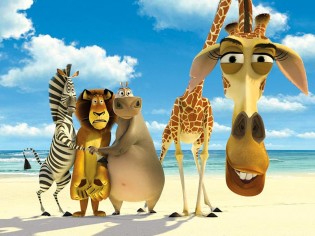Even science tells fairy tales to explain things (or why I believe in God)
 Like many things in life, the island of Madagascar is a mystery. A mini continent off the southeast coast of Africa, it features all kinds of crazy animals that shouldn’t be there.
Like many things in life, the island of Madagascar is a mystery. A mini continent off the southeast coast of Africa, it features all kinds of crazy animals that shouldn’t be there.
How did they get there?
Since there’s no evidence of a land bridge, scientific consensus says that animals from Africa suddenly got the urge to hit the open seas on self-made rafts and hope for the best, even though currents and prevailing winds blow away from the island.
I imagine the sporadic migration of seafaring land animals went something like this:
Animal 1: “Man, I’ve had it with this place. How about we board a bunch of natural rafts capable of holding and feeding a lot of animals for at least 300 miles, enter an unfamiliar habitat that neither our bodies nor our minds will be able to adapt to (the ocean), and see where it takes us? Even though I have no concept of sea navigation or charting, I have a hunch that we might end up on the fourth largest island in the world (Who said animals can’t be spontaneous!?) To survive the trip, we’ll also need to promise not to eat each other en route. Either that or strategically board rafts by species. Sound good?”
Animal 2: “Okay. I’ll go tell the others.”
This thesis and all its plausible varieties, of course, are absurd. More absurd is the inability of the scientific community at times to simply say, “We don’t know.”
I say that all the time when asked to explain things I have studied but still don’t understand. Or things that remain a mystery in general. In fact, not only is saying “I don’t know” the mark of an honest man, it’s the mark of a confident, non-omniscient man.
When I was a confused (but loved) 18 year old kid, I remember blasting my devout father on his belief in God while seated in his 1988 Sterling. I asked all the universally cliche questions. “If God exists, why does he let bad things happen to good people? If there is a God, how could there only be one true religion? And why is the universe so freakin’ big and how could it ever have a beginning or an end?”
Rather than preach to me, my father—armed with a PHD in psychology—mostly listened. He answered what he could, but I kept firing back with, “How??!!” “Why!!??” and “You can’t know that!!!”
Finally, my father said in a firm but sincere tone, “You’re right, Blake. I don’t know. I just believe it. I believe the (existential) things your mother and I have taught you to be true. Not because I want to believe them. But because I have a spiritual witness that they are. You can, too. But you must give faith a chance.”
There are few men I respect more than my father. Hearing him say “I don’t know” that day sealed the deal for me. A seed of faith had been planted. In that moment, I resolved to find out for myself if what he taught was true.
Obviously, there were conflicts of interests. As his son, it would be a lot more convenient for me to accept his teaching rather than admitting that the first 18 years of my life may have been a fairy tale at best, or calculated lie at worst. But truth holders procreate as much as non-truth holders, I thought. So if my father was a truth holder, who was I to reject the possibility of his thesis simply because of my association to him?
A year later after a lot of prayer, I had received several witnesses for myself. Since then, I have continued to receive witnesses, although not as often or as intense as during my enlightenment, spiritual revival, or whatever you call it. Consequently, my life has been 100 — nay, a 1000 — times sweeter than any of the more popular alternatives I believed in as a young adult.
But I digress. The takeaway is this: Every belief system, whether atheism, agnosticism, or creationism, requires faith. And they all invent stuff to make themselves feel better, to fill in the gaps, or to give the illusion of control when there is none.
To deride one belief system for being more fairy tale than another gets you nowhere.
DISCLOSURE: I believe science and deity are compatible. I believe in evolution and scientific fact. I don’t believe in all scientific theories like the above, however, because my sixth grade science teacher taught me there’s a ginormous difference between the two. As for God’s part, I believe he set this all in motion, wrote scientific law, programmed animal behavior, and ultimately gave humans dominion and agency. Not only is he the greatest scientist I know, he hosts one mean party. This story first published to blakesnow.com in 2012.
2 Comments
As I’m older, what I find more interesting than what people do or don’t believe in is what parts they choose to ignore about the things they do believe in.

“The real takeaway is this: Every belief system, whether atheism, agnosticism, or creationism, requires faith. And they all invent stuff to make themselves feel better, to fill in the gaps, or to give the illusion of control even when there is none.” That is a good couple of sentences. 🙂